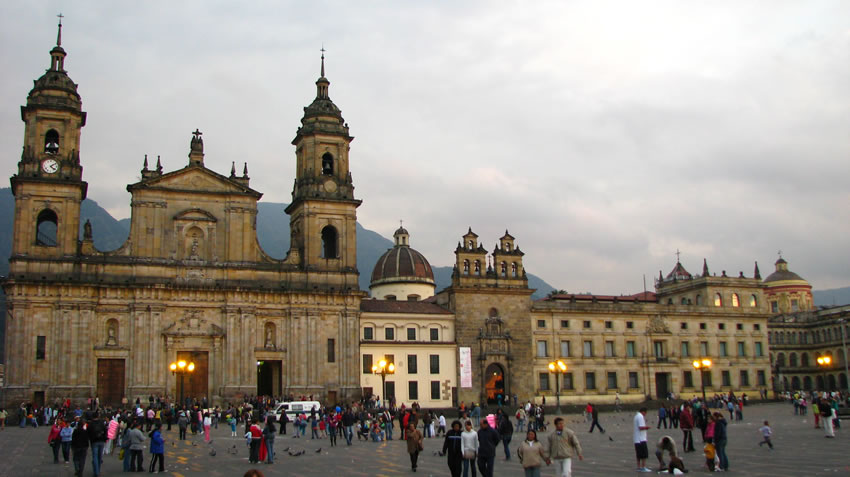This is a guest post by Nate Alger
Have you ever been to Colombia?
If not, you are missing out on one of the best kept secrets in Latin America. It is a country filled with life, lots of culture, and great food to eat!

It’s the place that I have called home for the past 4 months and the country that my wife Andrea grew up in. She has given me some inside information and provided me with some fun Colombian slang words to show you.
We based this article off a YouTube video that we produced featuring actual Colombians speaking the 10 Colombian Slang Expressions. If you want to hear these phrases spoken by actual Colombians than check out the video.
10 Popular Colombian Slang Expressions
1) Quiubo
It’s like saying, “What’s up” in English. Or another way of saying it is, “How’s it going?”
It’s a very common phrase used among family, friends, and co-workers. Basically, it’s great in any informal setting. So don’t try this one on your serious Colombian boss.
Here’s an example in a normal Colombian dialogue:
A: Quiubo, ¿Que mas?
B: Bien, gracias a Dios.
Translation:
A: Hows is going, what’s going on? B: Everything is good, thank the Lord.
2. ¡Que bacano! or ¡Tan bacano!
Both these phrases are extremely popular in Colombia.
It’s the equivalent of saying, “That’s awesome” or “that’s great.” If you think something is really awesome make sure to say, “¡Que bacano!”
Here are a couple examples in daily conversation:
A: Compre un nuevo celular——–B: ¡Que bacano!
A: Si, mi mama me dio la plata—–B: ¿Enserio? ¡Tan bacano!
Translation:
A: I just bought a new cell phone. B: That’s awesome!
A: My mom just gave me money. B: Really? That’s great!
3. Que Pereza
Here’s another one that I hear all the time in Colombia. It essentially means, “What a pain.”
You can also use it if something is really boring. So next time you have a boring project at work or one you really don’t want to do, take a look over at your co-worker and say, “¡Que pereza!”
Here’s a couple examples:
A: Tengo que limpiar mi cuarto, ¡Que pereza!
Translation:
I have to clean my room. What a bore!
A: Debo estudiar cálculo. ———–B: ¿Enserio? ¡Que pereza!
Translation:
A: I have to study calculus. ———-B: Really? That’s so boring!
4. Hacer Una Vaca
Are you about to watch a sports game with friends and you need people to chip in for pizza?
It’s time to “hacer una vaca.” This one is only used in the plural form though.
For instance: “Hagamos una vaca” or “Por qué no hacemos una vaca” means “Let’s all put money together for…”
Let’s take a look at this phrase in action:
A: ¡Tengo mucha sed!——B: Hagamos una vaca para la gaseosa.
Translation:
I’m so thirsty. Let’s chip in to buy a soda.
5. Que Boleta
This phrase means, “That’s not fair!” or “That’s not nice!”
Basically, you can use this phrase when you are in a bad situation or something bad happened when someone treated you poorly.
My Colombian wife uses this one a lot whenever I do something she doesn’t like or is upset about.
Here’s an example:
A: Juan no tiene trabajo, su jefe lo despidió.
B: ¿Enserio? ¡Que boleta!, Él es un muy buen trabajador.
Translation:
A: Juan doesn’t have a job because his boss fired him. B: Really? That’s terrible, he is a great worker.

6. Por Si Las Moscas
This is one I am trying to use more and more. It means, “Just in case.”
It’s very common in Colombia where I live. If you think it is going to rain, you could make sure to bring an umbrella, “Por si las moscas.”
Here’s an example from a dialogue:
A: Piensas que debo traer repelente?
B: Si, tráelo por si las moscas, quizás hay muchos mosquitos.
Translation:
A: Do you think I should bring insect repellant?
B: Yes, bring it just in case as there might be lots of mosquitos.
7. Parar Bolas
You can use this one to signify, “Pay attention!” A common conjugation for most Colombians here is “¡Páreme bolas!”
This signifies someone telling them to pay attention already. My wife uses this one a lot when she tells me to pay attention to what she has to say.
Here’s an example in conversation:
A: ¿Usted hizo la tarea?—–B:(no contesta nada)—–A: Oiga, páreme bolas!
Translation:
A: Did you do your homework? (no response) B: Hey, pay attention to me!
8. Dar Papaya
“Dar papaya” means to make yourself an easy target. You can say, “No de papaya” o “no hay que dar papaya” when you are telling someone to be careful around others.
Parents can use this one to tell their kids to be careful and not make themselves an easy target.Here’s an example in conversation:
Here’s a conversational example:
A: ¿Por qué utiliza el celular aquí? ¡Estamos en el centro, no de papaya!
Translation:
A: Why are you using your phone here. We are downtown, don’t make yourself an easy target [to get robbed]!
9. Que Embarrada o Embarrarla
Here’s another very common Colombian slang expression. I hear this one said all the time.
“Que embarrada” can be used when something bad happens and to express that you are sorry about it.
You can also say, “La embarre” (embarrarla) when you make an error.
Here’s and example in conversation:
A: la abuela de Alex murió——-B: ¿Si? ¡Qué embarrada!
A: La embarré en el examen, tuve 7 errores.
Translation:
A: Alex’s grandma passed away. B: Really? I’m so sorry to hear that!
A: I really screwed up on the test, I had 7 mistakes.
10. Mamar Gallo
We have now reached our 10th and final popular Colombian slang expression.
“Mamar gallo” means to “mess around” or to “joke around.” You can use this phrase to tell someone to stop messing around. I like this phrase a lot as I like to “Mamar gallo” at times.
Example in conversation:
A: ¡Deje de mamar gallo y limpie la habitación!
Translation:
Stop messing around and clean your room!
Other Colombian Slang Words to Learn (and sound like a native)
Here’s a few more Colombian phrases or words you can learn.
They are all quite common and will be universally understood by just about any Colombian and probably by most Latinos.
Try a few out on a Colombian friend or language partner.
- Que oso = How embarrassing!
- Tengo un filo = I am super hungry
- Me estoy asando = It’s boiling hot in here
- Tiene huevo = What nerves!
- Que chevere = That’s great/ Cool
- Que jartera = What a pain (as well)
- Mentiras = I am joking!
- Arruncharse = to cuddle
- Camellar = trabajar
Wrapping It Up
As a quick reminder if you want to check out these Colombian Slang Expressions spoken by Colombian natives check out this short dramatic video.
Better yet, download Andrea’s cheat sheet and get the 1 page PDF with the important phrases and how to use them. It’s in both English and Spanish to help you learn something new.
I hope you have learned something new or a new phrase you can try out with a Colombian friend.
My recommendation is to travel to Colombia and use a couple of these phrases on locals. They would be happy to play along with your slang words and you will be sure to sound like a native.
Colombia is a fantastic place to visit with crystal clear beaches, tropical beaches, and happy people to meet. It’s nothing like the dangerous, drug-infested reports that are often portrayed in the government or media (although it does have dangerous parts).

I enjoyed Colombia so much that I even started a relationship with my wife here (met her in Peru).
Finally, whatever your reason is for learning Colombian expressions, my one hope is that you actually use them!
About the writer
Nate and his wife Podcast and teach Spanish to Intermediate and Advanced language learners over at SpanishlandSchool.com. He loves to travel (particularly in South America) and writes on his hikes at LiveOutdoorsy.com. If you have any Colombian questions please feel free to reach out!